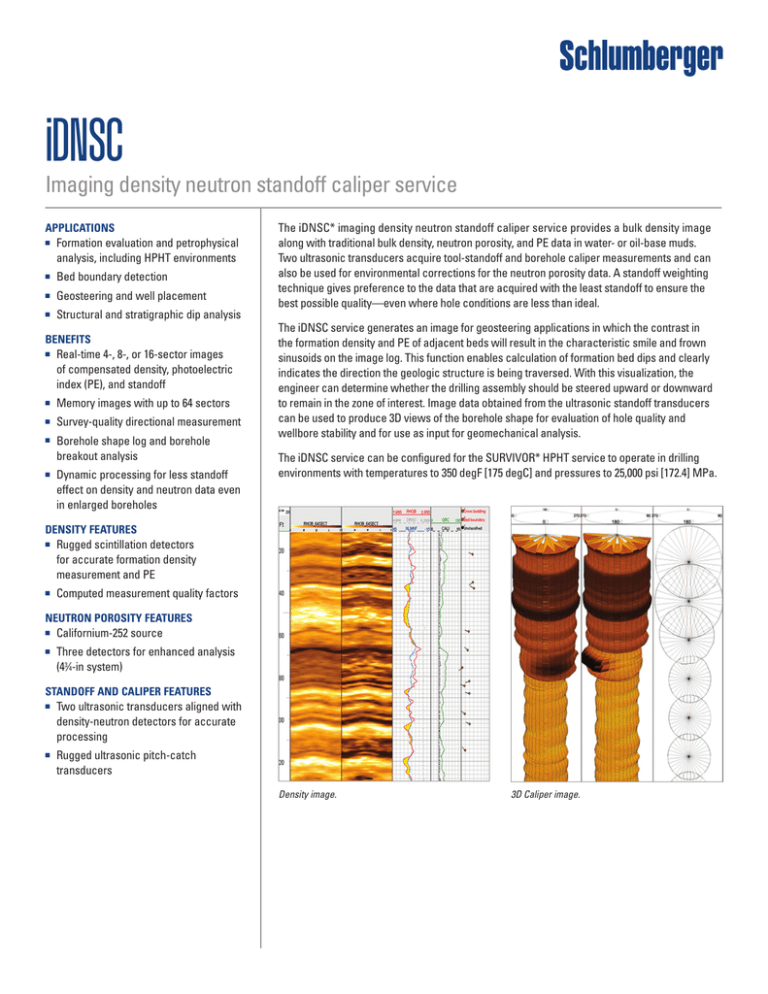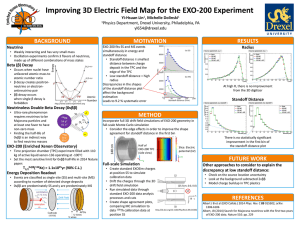
iDNSC
Imaging density neutron standoff caliper service
APPLICATIONS
■■
Formation evaluation and petrophysical
analysis, including HPHT environments
■■
Bed boundary detection
■■
Geosteering and well placement
■■
Structural and stratigraphic dip analysis
BENEFITS
■■
Real-time 4-, 8-, or 16-sector images
of compensated density, photoelectric
index (PE), and standoff
■■
Memory images with up to 64 sectors
■■
Survey-quality directional measurement
■■
■■
Borehole shape log and borehole
breakout analysis
Dynamic processing for less standoff
effect on density and neutron data even
in enlarged boreholes
The iDNSC* imaging density neutron standoff caliper service provides a bulk density image
along with traditional bulk density, neutron porosity, and PE data in water- or oil-base muds.
Two ultrasonic transducers acquire tool-standoff and borehole caliper measurements and can
also be used for environmental corrections for the neutron porosity data. A standoff weighting
technique gives preference to the data that are acquired with the least standoff to ensure the
best possible quality—even where hole conditions are less than ideal.
The iDNSC service generates an image for geosteering applications in which the contrast in
the formation density and PE of adjacent beds will result in the characteristic smile and frown
sinusoids on the image log. This function enables calculation of formation bed dips and clearly
indicates the direction the geologic structure is being traversed. With this visualization, the
engineer can determine whether the drilling assembly should be steered upward or downward
to remain in the zone of interest. Image data obtained from the ultrasonic standoff transducers
can be used to produce 3D views of the borehole shape for evaluation of hole quality and
wellbore stability and for use as input for geomechanical analysis.
The iDNSC service can be configured for the SURVIVOR* HPHT service to operate in drilling
environments with temperatures to 350 degF [175 degC] and pressures to 25,000 psi [172.4] MPa.
DENSITY FEATURES
■■
■■
Rugged scintillation detectors
for accurate formation density
measurement and PE
Computed measurement quality factors
NEUTRON POROSITY FEATURES
■■
■■
Californium-252 source
Three detectors for enhanced analysis
(43⁄4-in system)
STANDOFF AND CALIPER FEATURES
■■
■■
Two ultrasonic transducers aligned with
density-neutron detectors for accurate
processing
Rugged ultrasonic pitch-catch
transducers
Density image.
3D Caliper image.
iDNSC
Tool Specifications
Nominal tool OD, in [mm]
Hole size, in [mm]
Tool length, ft [m]
Battery length, ft [m]
Flow range, galUS/min [m3/min]
Pressure drop in water, psi [kPa]
At 750 galUS/min
At 500 galUS/min
At 375 galUS/min
At 250 galUS/min
At 100 galUS/min
Density Sensor Specifications
Measurement type and detector type
Source isotope
Source activity, GBq
Measurement
Density, g/cm3
Density porosity§, %
Photoelectric index, Pe
Maximum standoff, in [mm]
Samples per second
Accumulation interval, s
Neutron Porosity Specifications
Measurement type and detector type
Source isotope
Source activity, GBq
Measurement
Neutron porosity§, %
Maximum standoff, in [mm]
Accumulation interval, s
Standoff and Caliper Specifications
Measurement type and detector type
Number of transducers
Samples per second
Measurement
Mud weight range, lbm/galUS [g/cm3]
Max. standoff in 10 lbm/galUS, in [mm]
Max. standoff in 14 lbm/galUS, in [mm]
Max. standoff in 18 lbm/galUS, in [mm]
Standoff accuracy, in [mm]
Caliper accuracy‡‡, in [mm]
Environmental specifications
Max. vibration, gn [m/s2]
Max. shock, gn [m/s2]
Max. temperature, degF [degC]
Max. working pressure, psi [MPa]
Mud sand content, %
†
At
43⁄4 [121]
57⁄8 to 77⁄8 [149 to 200]
19.6 [6]
15.5 [5]
0 to 375 [0 to 1]
63⁄4 [171.5]
81⁄2 to 97⁄8 [216 to 251]
19.8 [6]
15.5 [5]
0 to 750 [0 to 3]
n/a
n/a
65 [448]
29 [200]
6 [41]
250 [1,724]
85 [586]
50 [345]
n/a
n/a
Gamma-gamma, Nal scintillation
Cesium-137
63
Range
1.0 to 3.1
0 to 100
0 to 6
1 [25]
100
2 to 60
Accuracy
±0.02
±0.9
±0.25
Repeatability†
±0.01
±0.7
±0.25
Vertical Resolution‡, in [mm]
15 [381]
15 [381]
3 [76]
Accuracy
±1.5
Repeatability††
±0.9
Vertical Resolution‡, in [mm]
22 [559]
Neutron-neutron/helium-3
Californium-252
0.6
Range
0 to 100
3 [76]
2 to 60
Ultrasonic, piezoelectric
2
100
Water-Base Mud
8.3 to 18 [1 to 2]
3 [76]
2.5 [63.5]
1.5 [38]
±0.1 [2.5]
±0.15 [4]
Oil-Base Mud
8 to 14 [0.9 to 1]
2.5 [63.5]
2 [50]
n/a
20 [200] (Grms random, 5 to 1,000 Hz)
500 [5,000]
302 [150], 350 [175]§§
25,000 [172]
1
2.4 g/cm3, Pe of 5, and logging speed of 90 ft/h.
‡
With minimal filtering.
§
Not true porosity.
††
At 30% and logging speed of 90 ft/h.
‡‡
Accuracy of caliper function varies with speed of sound in drilling fluid.
§§ Standard
tool configuration 32–302 degF [0–150 degC], optional SURVIVOR HPHT service rating 32–350 degF [0–175 degC].
*Mark of Schlumberger
Copyright © 2013 Schlumberger. All rights reserved. 13-PF-0040
slb.com/iDNSC

